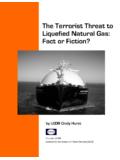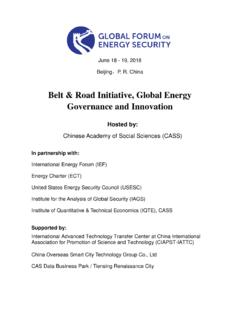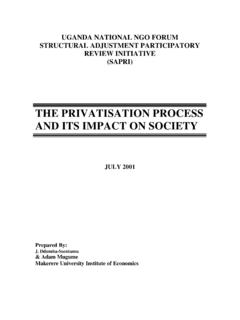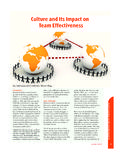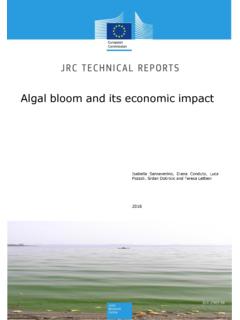Transcription of Dependence on Middle East energy and its impact on …
1 Dependence on Middle east energy and its impact on global security "We do have to do something about the energy problem. I can tell you that nothing has really taken me aback more, as Secretary of State, than the way that the politics of energy is [..] 'warping' diplomacy around the world. It has given extraordinary power to some states that are using that power in not very good ways for the international system, states that would otherwise have very little power." Secretary of State Condoleezza Rice, testimony before the Senate Foreign Relations Committee, April 5, 2006.
2 Throughout the 19-centrury nearly half of the world s crude oil supply came from the gushing oilfields surrounding the Azeri city of Baku. At that time, petroleum supplied only four percent of the world s energy , giving the Caspian region little strategic advantage in the international stage. But as the world economy embarked on a steep growth trajectory, Dependence on petroleum grew significantly. Today, oil supplies about 40 percent of the world s energy and 95 percent of its transportation energy . As a result, those who own the lion share of the reserves of this precious energy source are at the driver s seat of the world economy and their influence is steadily growing.
3 Since the 1930s the Middle east has emerged as the world s most important source of energy and the key to the stability of global economy. This tumultuous region produces today 37 percent of the world s oil and 18 percent of its gas. When it comes to reserves, the Persian Gulf is king. It is home to 65 percent of global oil proven reserves and 45 percent of its natural gas. The Middle east also controls a significant portion of the hydrocarbons that are yet to be discovered. According to the Geological Survey over 50 percent of the undiscovered reserves of oil and 30 percent of gas are concentrated in the region primarily in Saudi Arabia, Iran, Iraq, Kuwait, UAE and Libya.
4 The concentration of so much of the world s hydrocarbons in this geographical location means that as long as the modern economy depends on the supply of oil and natural gas, the Middle east will play a key role in global politics and economy. As it is, most of the world s countries are heavily dependent on Persian Gulf oil. In 2006, the Middle east supplied 22 percent of imports, 36 percent of OECD Europe s, 40 percent of China s, 60 percent of India s, and 80 percent of Japan s and South Korea s. Even oil- rich Canada is dependent on the Middle east .
5 Forty five percent of Canada s oil imports originate in the Barring a major technological transformation, global dependency on the Middle east is only going to grow. According to the International energy Agency, from now to 2030, world oil consumption will rise by about 60 percent. Transportation will be the fastest growing oil-consuming sector. By 2030, the number of cars will increase to well over billion from approximately 700 million today. Consequently, global consumption of gasoline could double. The two countries with the highest rate of growth in oil use are China and India, whose combined populations account for a third of humanity.
6 In the next two decades, China's oil consumption is expected to grow at a rate of percent per year and India s percent. (Compare to a 1-3 percent growth for the industrialized countries). As a result, by 2030 Asia will import 80 percent of its total oil needs and 80 percent of this total will come from the Persian Gulf. The reason why 1 energy Information Administration, 1 Persian Gulf countries share of the world s energy pie is likely to increase has to do not only with geology but also with resource management.
7 While non- Middle east countries pump at full speed, Middle east producers, many of them members of the Organization of Petroleum Exporting Countries (OPEC), stick to a quota and produce well under their capacity. This means that non-OPEC oil is running out almost twice as fast as OPEC s. Exxon Mobil Corporation has estimated that non-OPEC production--this includes Russia and West Africa--will peak within a decade, making recoverable oil left outside the Middle east world scarcer and On the other hand, the reserve-to-production ratio among Persian Gulf producers ranges between 80 and 100 years, allowing those countries to stay in the race decades after their competitors have depleted their reserves.
8 This is likely to lead to global Dependence on the region of unprecedented scale with considerable implications for global security and economy; as the Chief Economist of the International energy Agency put it: We are ending up with 95 percent of the world relying for its economic well being on decisions made by five or six countries in the Middle east . 3 Conventional wisdom, concerned only with smooth functioning of the market, says that ownership of oil is meaningless, that it does not matter much if most of the world s oil is owned by one regime or the other.
9 But in the case of the Middle east resource ownership does matter. The region is riddled with deepening ethnic and political tensions, terrorism, corruption and authoritarianism. In addition, there are problems that have no solution in sight and that will no doubt directly affect the supply of energy from the Middle east , among them a growing rift between Sunnis and Shiites, tension between the West and an increasingly radicalized Muslim world, increasing terrorist activity against oil facilities, protectionism, lack of investment, unresolved border disputes and the growing uncertainty about the political stability of key energy producers like Saudi Arabia, Iran, and Iraq.
10 The energy security and national security problems resulting from reliance on a single energy resource that is primarily located in such a volatile area are likely to be intensified as demand for oil grows. The region s problems will no doubt impact not only the world s economy and security but also consuming nations attitudes and policies toward the region s producers as well as toward each other. impact on the war on radical Islam Despite promises by the Middle Eastern governments to stop terrorist financing, six years after September 11, wealth generated by the region s oil rich countries continues to flow to terrorist organizations and organizations promoting radical Islam.



